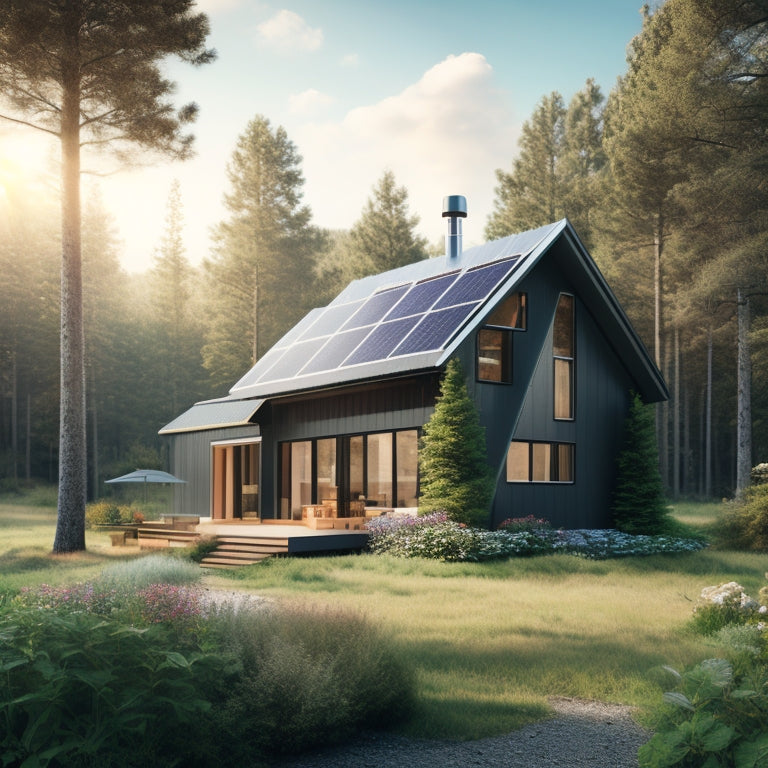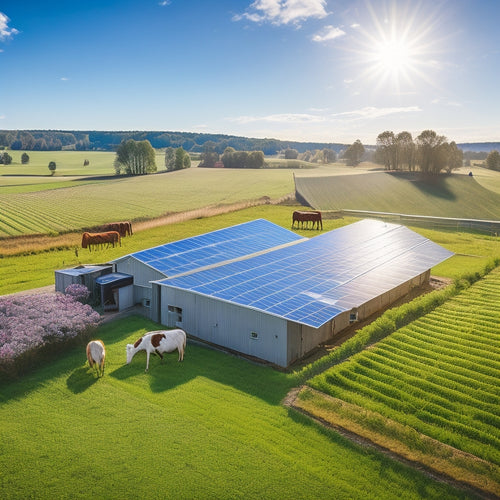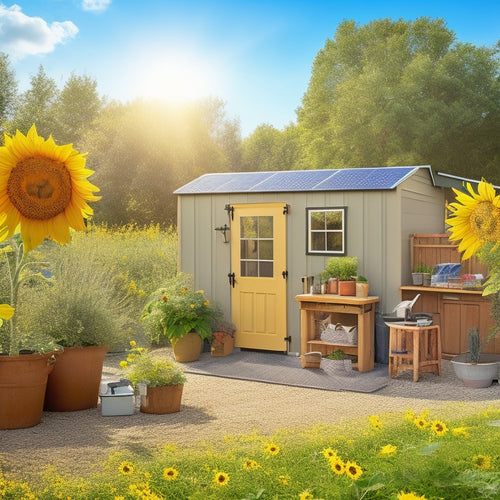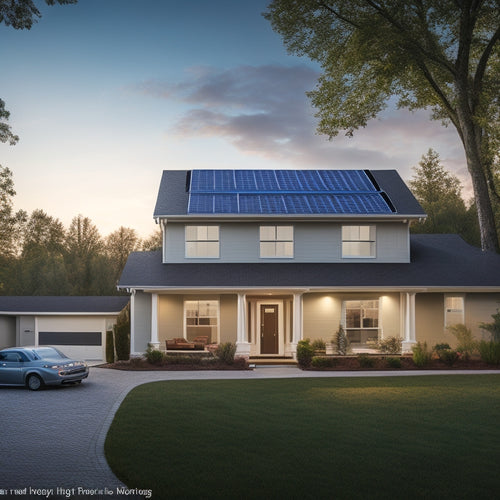
Achieve Grid Independence With Off-Grid Solar Systems
Share
You can break free from the grid by leveraging off-grid solar systems, just like over 180,000 American homes that have already made the switch. By examining how off-grid solar works, you'll be empowered to choose the right system for your needs, from selecting durable components to ensuring accurate system sizing. You'll need to contemplate energy storage solutions, like deep cycle batteries, and prioritize component compatibility for peak performance. As you explore off-grid solar, you'll discover the benefits of energy independence, self-sufficiency, and a frugal lifestyle, and discover the freedom that comes with generating your own clean energy.
Key Takeaways
• Achieve independence with off-grid solar systems, offering unparalleled freedom and self-sufficiency from the grid.
• Ensure accurate system sizing by conducting load calculations to determine energy requirements and avoid undersizing or oversizing.
• Select durable components, including solar panels, charge controllers, and inverters, for reliability and optimal performance.
• Choose the right battery bank based on energy needs, budget, and factors like cost, maintenance, and cycle life.
• Implement proper design, installation, and maintenance to ensure system efficiency, durability, and longevity.
Benefits of Off-Grid Living
Living off the grid provides you with unparalleled independence and freedom from reliance on public utilities, allowing you to generate your own clean energy and reduce your carbon footprint to a great extent.
By living off the grid, you'll experience a sense of self-sufficiency and environmental stewardship, as you're no longer dependent on public utilities.
You'll also simplify your living, free from the burdens of urban life, and enjoy increased security in a peaceful, rural retreat.
The quiet solitude and fresh air will rejuvenate your spirit, and you'll find yourself building a stronger sense of community with like-minded individuals.
Embracing a frugal lifestyle, you'll appreciate the personal freedom that comes with being grid-independent.
You'll no longer be tied to the grid, and you'll relish the freedom to live life on your terms.
How Off-Grid Solar Works
As you explore off-grid solar systems, you'll want to understand the inner workings that make them tick.
At the heart of these systems are the components that work together seamlessly, including solar panels, charge controllers, and inverters.
System Components Overview
Your off-grid solar system relies on several critical components working together seamlessly to provide reliable, sustainable energy. As you design your system, you'll need to take into account each component's role in the energy generation and distribution process.
A well-designed system guarantees maximum energy production and efficient energy distribution. The system's foundation is the solar array, comprising photovoltaic (PV) panels that convert sunlight into electrical energy. The PV panels are connected to a charge controller, which regulates the flow of energy to the system's energy storage component (which we'll discuss later). The charge controller prevents overcharging or undercharging, ensuring component durability and extending the system's lifespan.
A critical aspect of system design is selecting components that can withstand harsh environmental conditions and provide reliable performance over time. Look for components with a proven track record of durability, such as anodized aluminum frames and tempered glass PV panels.
Energy Storage Solutions
You'll need a reliable energy storage solution to harness the electrical energy generated by your solar array, which is where deep cycle batteries come into play. These batteries are designed to provide Power Reliability by storing excess energy generated during the day for use during the night or on cloudy days.
With a deep cycle battery bank, you can guarantee a steady supply of electricity, even when the sun isn't shining.
Here are three key considerations for your energy storage solution:
-
Depth of discharge: A deep cycle battery's capacity to be deeply discharged while maintaining its lifespan is essential. Look for batteries with a high depth of discharge (DOD) rating for excellent performance.
-
Cycle life: The number of charge and discharge cycles a battery can handle affects its overall lifespan. Choose batteries with a high cycle life for long-term dependability.
-
Smart Charging: Advanced charging systems with built-in smart charging capabilities can optimize your battery's performance, reducing wear and tear, and ensuring maximum Power Reliability.
Choosing the Right System
When choosing an off-grid solar system, you'll need to take into account two critical factors: system sizing essentials and component compatibility matters.
Getting these aspects right guarantees that your system operates efficiently and meets your energy needs.
System Sizing Essentials
Sizing an off-grid solar system requires a thorough understanding of your energy needs. An undersized system can leave you without power, while an oversized system can be a costly waste of resources.
When it comes to system sizing, you'll need to conduct a load calculation to determine your energy requirements. This involves identifying all the appliances and devices you plan to power with your off-grid system, as well as their respective energy consumption rates.
Here are three essential steps to guarantee accurate system sizing:
-
Conduct an energy audit: Identify your energy-intensive appliances and devices to determine your overall energy needs.
-
Calculate your daily energy usage: Determine your total daily energy consumption in watt-hours (Wh) to size your system accordingly.
-
Consider your system's autonomy: Calculate how many days of autonomy you need, considering factors like battery capacity and solar irradiance.
Component Compatibility Matters
Your off-grid solar system's performance relies heavily on the seamless integration of its components, making it essential to choose parts that work harmoniously together. As you begin on designing your off-grid solar system, it's vital to prioritize component compatibility to guarantee peak performance and longevity.
System integration is key to achieving a reliable and efficient power generation system.
When selecting components, consider the hardware harmonization of your system. Make sure that your solar panels, charge controllers, inverters, and batteries are compatible and optimized to work together seamlessly. Incompatible components can lead to reduced system efficiency, increased energy losses, and even system failure.
By choosing components that are designed to work together, you can maximize your system's energy output, reduce maintenance needs, and extend its lifespan. Take the time to research and select high-quality components that are designed for off-grid solar applications.
Sizing Your Off-Grid System
You'll need to crunch some numbers to determine the size of your off-grid solar system, as undersizing or oversizing can have significant implications for your energy independence. A system that's too small won't meet your energy needs, while an oversized system will be a costly waste of resources.
To get it just right, you'll need to conduct a thorough load analysis, which involves calculating your energy requirements based on the appliances and devices you plan to power. This will give you a clear picture of your energy needs and help you determine the best system size.
Here are three key factors to take into account when sizing your off-grid solar system:
-
Daily energy usage: Calculate your total daily energy needs in watt-hours (Wh).
-
Peak sun hours: Determine the average daily peak sun hours in your area to make sure your system can generate enough power.
-
System losses: Account for energy losses due to inefficiencies in the system, such as inverter losses and wiring losses.
Off-Grid Solar Battery Options
When it comes to off-grid solar systems, selecting the right battery bank is crucial, as it directly impacts the system's overall performance, reliability, and lifespan. You need to take into account factors like cost, durability, and compatibility with your solar panel array.
Here's a comparison of popular off-grid solar battery options:
| Battery Technology | Cost Considerations | Cycle Life |
|---|---|---|
| Lead-Acid | Low upfront cost, high maintenance | 200-300 cycles |
| Lithium-Ion | High upfront cost, low maintenance | 3000-5000 cycles |
| Nickel-Cadmium | Moderate upfront cost, moderate maintenance | 1000-1500 cycles |
| Nickel-Metal Hydride | Moderate upfront cost, moderate maintenance | 500-1000 cycles |
As you assess these options, take into consideration your energy needs, budget, and system requirements. Lithium-Ion batteries, for example, are more expensive upfront but offer longer lifetimes and lower maintenance costs. Lead-Acid batteries, on the other hand, are more affordable but require more frequent replacement. By weighing these factors, you can select the best battery technology for your off-grid solar system.
Installation and Maintenance Tips
Properly installing and maintaining your off-grid solar system's battery bank is crucial to ensuring peak performance, longevity, and safety. You'll want to make sure that your system is designed and installed with a focus on reliability, efficiency, and durability.
When it comes to installation, consider the following key factors:
-
Grounding systems: Make sure that your system is properly grounded to prevent electrical shock and ensure the safety of people and equipment.
-
Weatherproofing considerations: Protect your system from the elements by using weather-resistant materials and designing your system to withstand extreme temperatures, humidity, and weather conditions.
-
Monitoring and control systems: Invest in a reliable monitoring and control system to track your system's performance, identify potential issues, and optimize energy production.
Frequently Asked Questions
Can I Use Off-Grid Solar With My Existing Electrical System?
You can integrate off-grid solar with your existing electrical system, but make sure System Integration is done correctly to avoid compatibility issues, checking Power Compatibility to guarantee seamless operation and efficient energy supply.
How Do I Handle Shading Issues With My Solar Panels?
You'll want to mitigate shading issues by optimizing panel orientation and conducting a thorough shading analysis to identify potential obstructions, ensuring maximum energy harvest and efficient system performance.
Are Off-Grid Solar Systems Suitable for Small Cabins or Tiny Homes?
You'll find off-grid solar systems perfect for small cabins or tiny homes, as they provide reliable Cabin Energy with a Tiny Footprint, ideal for remote locations with limited space and energy requirements.
Can I Expand My Off-Grid Solar System in the Future?
You can easily expand your off-grid solar system in the future by considering system scalability, evaluating your growing energy demands, and upgrading individual components to meet your increasing power needs.
Do Off-Grid Solar Systems Require Special Electrical Permits?
You'll need to obtain special electrical permits for your off-grid solar system, ensuring code compliance with local regulations, which vary by jurisdiction, so research permit requirements before installation to avoid costly rework or fines.
Related Posts
-

What Do I Need to Know About Farm Solar Panels
When considering farm solar panels, you need to assess costs, benefits, and technical specifics. Initial investment c...
-

Building an Emergency Backup Solar Power System in 5 Essential Steps
Building an emergency backup solar power system involves five key steps. First, assess your daily energy needs to ide...
-

Cost of Solar With Battery Backup
You're investing in a solar panel system with battery backup to guarantee reliable power during outages. The cost of ...


